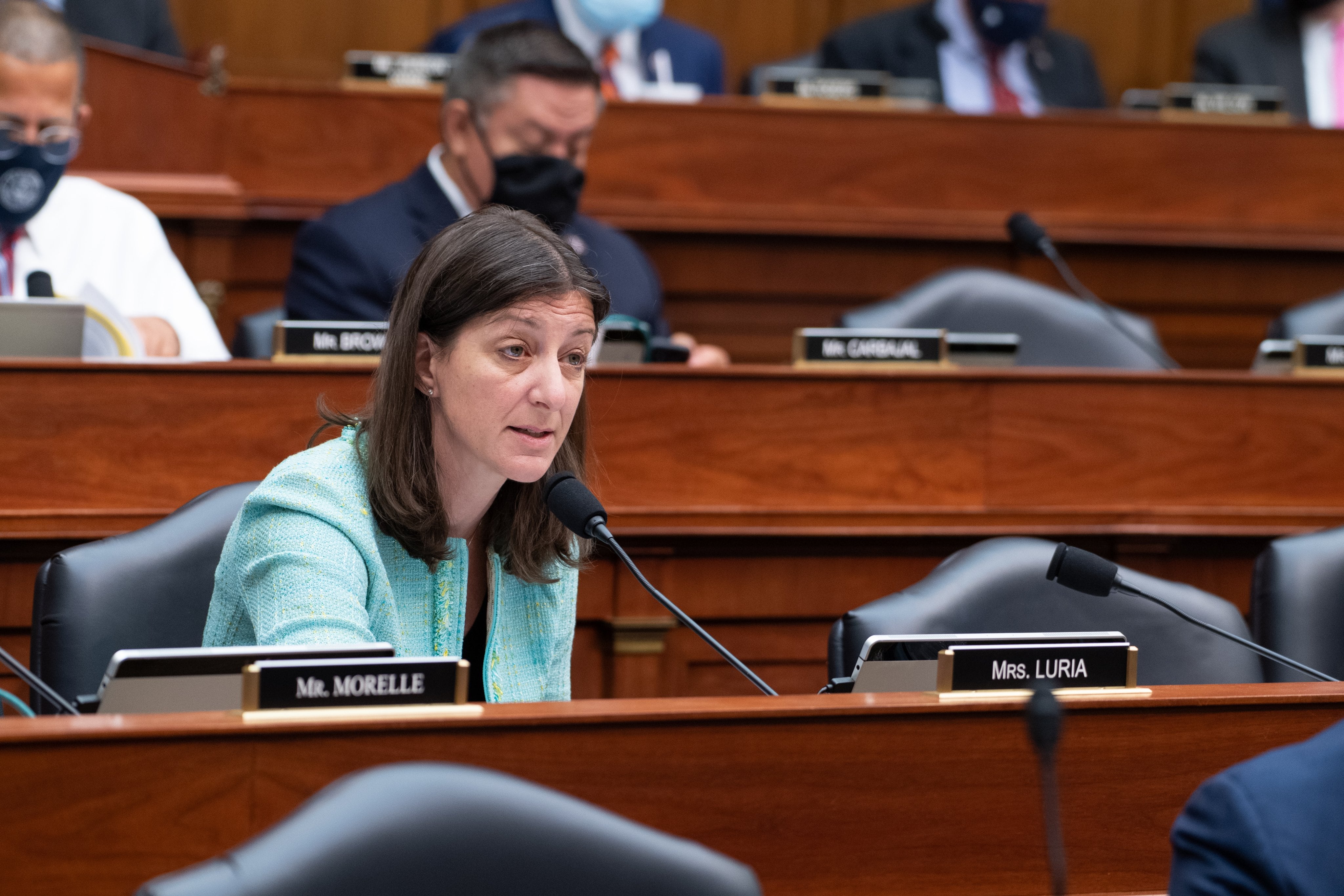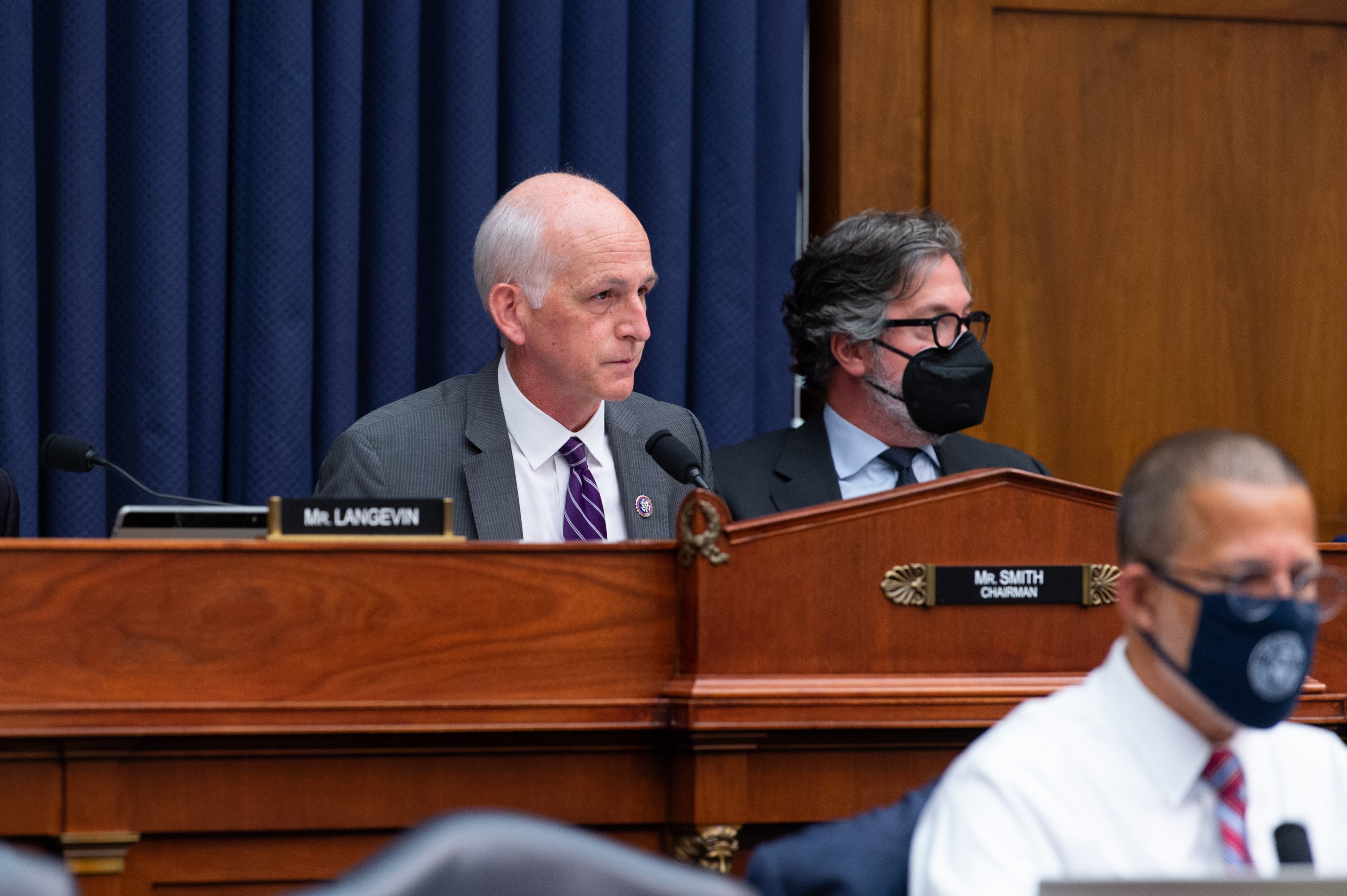WASHINGTON — In a bipartisan vote Thursday, a key House panel approved plans to boost defense spending by nearly $24 billion above White House plans for fiscal 2022, setting up a showdown later this year between progressive Democrats and moderates in the party over how much defense funding is too much.
The vote was included in the House Armed Services Committee’s annual daylong markup of the annual defense authorization bill, a marathon which included additional fights over the U.S. withdrawal from Afghanistan, issues of extremism and diversity in the ranks and whether to add women to future military drafts.
The defense policy bill is one of the most significant pieces of legislation passed by Congress each year, setting hundreds of spending priorities and defense policies for the coming fiscal year. The Senate passed its version earlier this summer, with the same top-line spending target of $740 billion.
President Joe Biden’s proposed fiscal 2022 budget for the Defense Department is about $715 billion, a slight boost over current year’s spending levels but smaller than the expected rate of inflation.
Republican lawmakers in the House and Senate have lobbied against Biden’s proposed figure for weeks, saying it is insufficient to counter threats like a growing Chinese military and terrorist groups worldwide.
Senate Democrats on the armed services panel went along with that argument, and Thursday’s vote generates even more momentum for the military funding plus-up.
“The bipartisan adoption of my amendment sends a clear signal: the president’s budget submission was wholly inadequate to keep pace with a rising China and a re-emerging Russia,” said Rep. Mike Rogers, R-Ala. and ranking member of the committee. “The defense of our nation will not be shortchanged by Congress.”
The 14 Democrats who voted with Republicans on the measure included Rep. Elaine Luria, who represents a shipbuilding heavy district in Virginia. She hailed the funding boost’s inclusion of public and private shipyards.
“The President’s defense budget fails to adequately address the rising threats of China, Iran and Russia and I will not hesitate to break with my party if it’s in the best interest of our national security and the local economy of Hampton Roads,” said Luria, the panel’s vice chair.
But progressive lawmakers signaled they will fight the measure.
Rep. Mark Pocan, D-Wis., said defense spending should be cut and redirected to fight COVID-19, climate change and cyber threats. The increase, he said, “was unwarranted and unnecessary, jeopardizing NDAA’s passage in the full House.”
Rep. Ro Khanna, D-Calif., blasted “bloated defense budgets” and said “to increase [defense spending] goes against all logic” given the recent drawdown of troops from Afghanistan. He and Rep. Sara Jacobs, D-Calif., were the lone votes against advancing the bill to the floor.
The fight foreshadows progressive opposition that could create problems for Democratic leadership on the House floor.

Afghanistan
The mark-up came just days after the departure of all U.S. forces from Afghanistan, ending the nearly 20-year-old military presence there.
Early Thursday, Republicans offered a series of amendments and criticized Biden’s decision to withdraw American forces and his strategy to evacuate Americans and Afghan allies from the country. Democrats agreed with many of them, but scuttled a contentious measure from Rep. Mike Waltz, R-Fla., that said Congress has lost confidence in Biden as commander-in-chief.
During the debate, Rep. Mark Green, R-Tenn., and a retired Army flight surgeon, said “President Biden’s withdrawal from Afghanistan has left both Americans and allies stranded.”
“Despite the narrative in the White House, this entire operation has been saddled with error after grievous error,” he continued. “Reports from the White House, the media and the military have all been conflicting and suggest deceptiveness.”
The committee adopted other Republican amendments, some barring the administration from sharing monetary aid, equipment or information with the Taliban, and others that require the Pentagon to inform Congress of threats from al-Qaida and related terrorist groups, and related military operations.
Still another would require the Pentagon to brief Congress on the decision to leave Bagram Air Base, a move critics have questioned in light of the chaotic, crowded environment around the Kabul airport, the hub of evacuation operations over the last three weeks.
A bipartisan amendment from Reps. Jason Crow, D-Colo., and Liz Cheney, R-Wyo. would require the executive branch to give Congress details about over-the-horizon counterterrorism capabilities and their use; about U.S. military equipment left behind; about plans to retrieve hostages and Afghan allies from Afghanistan and about any military cooperation between the Taliban and China, Russia or Iran.
The panel adopted Cheney’s amendment to create a 12-member commission to assess the U.S. war in Afghanistan.
Committee Chairman Adam Smith, D-Wash., has promised hearings on the decades-long fight and the exit in coming months and chastised GOP colleagues for attempting to politicize the issue.
“The idea that the only thing that went wrong in Afghanistan is [decisions] that President Biden has made in the last six or seven months is not correct,” he said.
“We need a more honest discussion about what was going on.”

Other key fights
Afghanistan and spending totals weren’t the only controversial topics.
By a narrow margin, an amendment from Waltz and Rep. Chrissy Houlahan, D-Pa., passed requiring women to register with the Selective Service System. The Senate version of the bill includes a similar proposal, making the dramatic change likely to come next year.
The panel also approved a “Buy American” proposal to raise the required percentage of domestic content for Pentagon procurements from 55 percent to 60 percent when the bill is enacted, 65 percent by 2024 and to 75 percent by 2029. Rep. Donald Norcross, D-N.J., sponsored the amendment.
Committee members also backed a proposal from Rep. Mike Gallagher, R-Wis., to make it harder for recently retired generals to serve as defense secretary.
Officers would have to be retired for 10 years, and a waiver would require a three-fourths vote in both chambers. Gallagher argued retired generals are being selected to the top civilian job too frequently, pointing to former Defense Secretary Lloyd Austin and his predecessor, Jim Mattis.
The panel also adopted a proposal from Rep. Veronica Escobar, D-Texas, to ban private funding for interstate deployment of the National Guard. The amendment comes after South Dakota Gov. Kristi Noem let a Tennessee billionaire subsidize the deployment of National Guard members to the southern border in Texas earlier this summer.
On nuclear weapons, the committee approved an amendment from Cheney to block the reduction of the number of deployed intercontinental ballistic missiles below 400. The panel rejected her amendment to add funding back for the B83, a gravity bomb scheduled for retirement.
The panel turned away a Republican amendment calling for the Pentagon to share details with Congress about its cancelled $10 billion cloud computing contract.
Assuming full chamber passage later this month, the defense authorization bill will head to negotiations with the Senate. That work typically takes place during the bulk of congressional summer recess, but the administration’s late submission of its federal budget proposal pushed it back several months.
The authorization bill has managed to withstand partisan infighting and pass out of Congress annually for more than five decades. Extending that streak this year will require a legislative rush to craft a final bill sometime this fall, alongside other non-military budget and policy priorities.
Joe Gould was the senior Pentagon reporter for Defense News, covering the intersection of national security policy, politics and the defense industry. He had previously served as Congress reporter.
Leo covers Congress, Veterans Affairs and the White House for Military Times. He has covered Washington, D.C. since 2004, focusing on military personnel and veterans policies. His work has earned numerous honors, including a 2009 Polk award, a 2010 National Headliner Award, the IAVA Leadership in Journalism award and the VFW News Media award.




